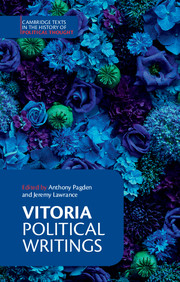Book contents
- Frontmatter
- Contents
- Dedication
- Editors' note
- Abbreviations and sigla
- Introduction
- Principal events in Vitoria's life
- Bibliographical note
- Critical note on texts and translation
- TEXTS
- 1 On Civil Power
- 2 I On the Power of the Church
- 3 II On the Power of the Church
- 4 On Law: Lectures on ST I-II. 90-105
- 5 On Dietary Laws, or Self-Restraint (extract)
- 6 On the American Indians
- 7 On the Law of War
- APPENDICES
- Biographical notes
- Glossary
- List of references
- Index
- Cambridge Texts in the History of Political Thought
5 - On Dietary Laws, or Self-Restraint (extract)
Published online by Cambridge University Press: 05 June 2012
- Frontmatter
- Contents
- Dedication
- Editors' note
- Abbreviations and sigla
- Introduction
- Principal events in Vitoria's life
- Bibliographical note
- Critical note on texts and translation
- TEXTS
- 1 On Civil Power
- 2 I On the Power of the Church
- 3 II On the Power of the Church
- 4 On Law: Lectures on ST I-II. 90-105
- 5 On Dietary Laws, or Self-Restraint (extract)
- 6 On the American Indians
- 7 On the Law of War
- APPENDICES
- Biographical notes
- Glossary
- List of references
- Index
- Cambridge Texts in the History of Political Thought
Summary
The relection On Dietary Laws, or Self-Restraint, was supposed to be delivered in 1537. Vitoria was ill in the early months of that year, and did not give his ordinary lectures on the second half of ST II-II. But his substitute, Andrés de Vega, knew the master was working on the knotty problem raised by Aquinas' treatment of cannibalism, a topic on which Vitoria had already delivered an unorthodox opinion in his first lecture cycle on the passage. The finished relection was finally delivered in early 1538; its proper title, De usu ciborum, is preserved only in MS P (fol. 96), which further announces that it is a re-reading of ST II-II. 141 ‘On Self-Restraint’. Only the subtitle On Self-Restraint was preserved in later witnesses – though if we are surprised to find cannibalism and human sacrifice the chief subjects of a piece headed ‘Temperance’, it may do to recall that Montaigne's discussion of Aztec sacrifices occurs in an essay ‘On Moderation’, immediately followed by the famous ‘Of the Cannibals’ (Essais I. 29, 30).
Vitoria's divisio promises two parts, the first of nine articles on gluttony and cannibalism, and the second of three articles on sexual incontinence. However, a few lines after the point where the ‘affair of the Indies’ is introduced (Article 5), the text breaks off in both P and L. Andrés de Burgos, the copyist of De usu ciborum in P, noted in his colophon that part of this fifth article, and the whole of the promised second part on lechery, were missing ‘in the original’ (fol. 105v).
- Type
- Chapter
- Information
- Vitoria: Political Writings , pp. 205 - 230Publisher: Cambridge University PressPrint publication year: 1991
- 1
- Cited by

